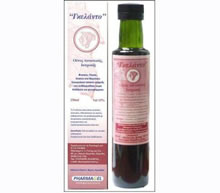
Λεξικό .. Anticholinergic agents
Anticholinergic agents
Drugs which have been regarded as more effective in relieving bronchoconstriction associated with chronic bronchitis. Ipratropium bromide may provide some bronchodilatation in patients with chronic bronchitis who fail to respond to the selective beta2-adrenoceptor stimulants.
Side-effects are rare and it does not increase sputum viscosity or affect mucociliary clearance of sputum. The aerosol inhalation has a slower onset of action than that the beta2-adrenoceptor stimulants, with a maximum effect 30-60 minutes after use. Ipratropium bromide can be effective in different types of watery rhinorrhoea; it has a quick onest of action and it is very long acting, but there can be problems with dryness in the nose. It can be useful in adults who have clear nasal discharge for more than one hour a day with no major problems from nasal blockage, no allergic basis for the rhinitis and no satisfactory response to antihistamines or steroid spray.
There is a diurnal variation in all types of rhinitis and in rhinorrhoea the peak is in the morning. In these circumstances ipratropium bromide can be used satisfactorily in a high dosage in the morning rather than four times daily. (See Ipratropium bromide). In 2008, studies on inhaled anticholinergic bronchodilators for chronic obstructive pulmonary disease (COPD) were published, some of them with contradictory messages. One study, and a meta-analysis suggested that inhaled ipratropium on the long- term is associated with increased risk for cardiac death [1]. Therefore some caution should be at place when prescribing this drug in patients with coronary or rhythmic cardiac disease.
On the other hand, a large randomized, placebo-controlled study on tiotropium did not suggested increased adverse cardio-vascular effects, but rather a diminution, and showed beneficial bronchodilator effect in patients with COPD. However the treatment did not attenuate the annual decline of lung function, and did not decrease mortality in these patients. References1. Singh S, Loke YK, Furberg CD. Inhaled anticholinergics and risk of major adverse cardiovascular events in patients with chronic obstructive pulmonary disease: a systematic review and meta-analysis. JAMA. 2008 Sep 24;300(12):1439-50 2. Rochat T, Janssens JP. Pneumology. Should we fear inhaled anticholinergic bronchodilators? Rev Med Suisse. 2009 Jan 14;5(186):135-7.
Γκέλης Ν.Δ. - Λεξικό Αλλεργίας - Εκδόσεις ΒΕΛΛΕΡOΦΟΝΤΗΣ - Κόρινθος 2013
Gelis Ν.D. - Dictionary of Allergies - VELLEROFONTIS Publications - Corinth 2013




